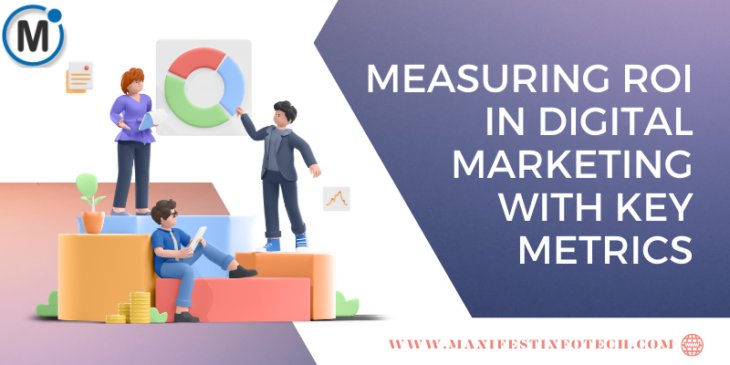
In this blog post, we’ll explore the key metrics essential for measuring ROI in digital marketing.
𝟏. 𝐖𝐞𝐛𝐬𝐢𝐭𝐞 𝐓𝐫𝐚𝐟𝐟𝐢𝐜 𝐚𝐧𝐝 𝐂𝐨𝐧𝐯𝐞𝐫𝐬𝐢𝐨𝐧 𝐑𝐚𝐭𝐞𝐬: 𝐓𝐡𝐞 𝐒𝐭𝐚𝐫𝐭𝐢𝐧𝐠 𝐏𝐨𝐢𝐧𝐭
The journey begins with tracking your website traffic. Tools like Google Analytics provide a treasure trove of data, including the number of visitors, page views, and bounce rates. Analyzing these metrics gives you a foundation for understanding user behavior. Beyond traffic, focus on conversion rates. Whether it’s a sale, sign-up, or download, knowing the percentage of visitors taking the desired action is pivotal in evaluating your campaign’s success.
𝟐. 𝐂𝐮𝐬𝐭𝐨𝐦𝐞𝐫 𝐀𝐜𝐪𝐮𝐢𝐬𝐢𝐭𝐢𝐨𝐧 𝐂𝐨𝐬𝐭 (𝐂𝐀𝐂) 𝐚𝐧𝐝 𝐋𝐢𝐟𝐞𝐭𝐢𝐦𝐞 𝐕𝐚𝐥𝐮𝐞 (𝐋𝐓𝐕): 𝐓𝐡𝐞 𝐅𝐢𝐧𝐚𝐧𝐜𝐢𝐚𝐥 𝐏𝐢𝐜𝐭𝐮𝐫𝐞
Calculating Customer Acquisition Cost (CAC) involves tallying the expenses associated with acquiring a customer. This figure, when compared to the Lifetime Value (LTV) of a customer, offers valuable insights. If your CAC is lower than the LTV, it indicates a healthy return. This metric helps in optimizing marketing spend and ensuring long-term profitability.
𝟑. 𝐒𝐨𝐜𝐢𝐚𝐥 𝐌𝐞𝐝𝐢𝐚 𝐄𝐧𝐠𝐚𝐠𝐞𝐦𝐞𝐧𝐭: 𝐁𝐞𝐲𝐨𝐧𝐝 𝐋𝐢𝐤𝐞𝐬 𝐚𝐧𝐝 𝐒𝐡𝐚𝐫𝐞𝐬
Social media platforms are powerful tools, and tracking engagement metrics is crucial. Monitor likes, shares, comments, and click-through rates. Understanding how your audience interacts with your content on these platforms helps refine your social media strategy. Tools like Facebook Insights and Twitter Analytics offer detailed data on user engagement.
𝟒. 𝐄𝐦𝐚𝐢𝐥 𝐌𝐚𝐫𝐤𝐞𝐭𝐢𝐧𝐠 𝐌𝐞𝐭𝐫𝐢𝐜𝐬: 𝐎𝐩𝐞𝐧 𝐑𝐚𝐭𝐞𝐬 𝐚𝐧𝐝 𝐂𝐥𝐢𝐜𝐤-𝐓𝐡𝐫𝐨𝐮𝐠𝐡 𝐑𝐚𝐭𝐞𝐬
In the realm of email marketing, open rates and click-through rates (CTRs) are key indicators of success. High open rates imply that your subject lines are compelling, while robust CTRs show that your content resonates with your audience. A/B testing different elements of your emails can help optimize these metrics over time.
𝟓. 𝐑𝐞𝐭𝐮𝐫𝐧 𝐨𝐧 𝐀𝐝 𝐒𝐩𝐞𝐧𝐝 (𝐑𝐎𝐀𝐒): 𝐌𝐚𝐱𝐢𝐦𝐢𝐳𝐢𝐧𝐠 𝐂𝐚𝐦𝐩𝐚𝐢𝐠𝐧 𝐄𝐟𝐟𝐢𝐜𝐢𝐞𝐧𝐜𝐲
For those investing in paid advertising, ROAS is a critical metric. Calculated by dividing the revenue generated from ads by the cost of the ads, a positive ROAS indicates profitability. This metric guides decisions on budget allocation and helps identify the most effective advertising channels.
𝟔. 𝐒𝐄𝐎 𝐏𝐞𝐫𝐟𝐨𝐫𝐦𝐚𝐧𝐜𝐞: 𝐕𝐢𝐬𝐢𝐛𝐢𝐥𝐢𝐭𝐲 𝐚𝐧𝐝 𝐑𝐚𝐧𝐤𝐢𝐧𝐠𝐬
Search Engine Optimization (SEO) is fundamental to digital marketing success. Monitor your website’s search engine rankings and organic traffic. Tools like SEMrush and Moz can provide insights into keyword performance, backlinks, and overall SEO health.
If you are looking for any services related to Website Development, App Development, Digital Marketing and SEO, just email us at nchouksey@manifestinfotech.com or Skype id: live:76bad32bff24d30d
𝐅𝐨𝐥𝐥𝐨𝐰 𝐔𝐬:
𝐋𝐢𝐧𝐤𝐞𝐝𝐢𝐧: linkedin.com/company/manifestinfotech
𝐅𝐚𝐜𝐞𝐛𝐨𝐨𝐤: facebook.com/manifestinfotech/
𝐈𝐧𝐬𝐭𝐚𝐠𝐫𝐚𝐦: instagram.com/manifestinfotech/
𝐓𝐰𝐢𝐭𝐭𝐞𝐫: twitter.com/Manifest_info
#DigitalMarketing #ROI #MarketingMetrics #Analytics #MarketingStrategy #DataDrivenMarketing #OnlineMarketing #DigitalROI #MarketingAnalytics #ConversionRates #SEO #SocialMediaMetrics #EmailMarketing #BusinessMetrics #DigitalStrategy #MarketingInsights #PerformanceMetrics #MarketingData #AdvertisingROI #OnlineAdvertising #ManifestInfotech #Blogs #Indore #India